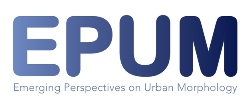Emerging Perspectives on Urban Morphology-kick off

The kick-off event of the international project “Emerging Perspectives on Urban Morphology: Researching and Learning through multiple practices” took place between December 12th-15th, in London, UK. The project will run for 28 months (November 2017-February 2020) and is funded by the Erasmus + program of the European Union.
EPUM aims at the integration of different, often isolated urban form research and teaching approaches through pedagogic innovation and Information and Communication Technology (ICT). It aims to develop an innovative, open and inclusive system of teaching and training in urban form from a multidisciplinary perspective, which is capable of enabling the current and future generation of planning and design professionals to address comprehensively and effectively the variety of issues and challenges faced by contemporary cities.
Contemporary cities are characterized by a variety of forms of socio-spatial patterns and increasing social, economic, and political fragmentation strongly related to their urban form. Urban municipal authorities, policy makers, urban designers and scholars are called to respond to such challenges and a variety of approaches on understanding urban form, both theoretical and operational, has developed. However, these are many times characterized by specific disciplinary and geographical trends and have seen the emergence of separate schools of thought. Each approach tends to be associated with a main research centre or with certain individual researchers and, despite some exceptions, they have traditionally been applied in isolation.
The teaching of urban form analysis in higher education institutions across Europe is also addressing contemporary cities’ issues from often isolated perspectives based on the aforementioned different schools of thought, either reflecting specific national educational trends or opting for a globalized approach cutting the knots with local specificities. There is still a lack of learning spaces which foster a multidisciplinary thinking about contemporary cities’ issues and which enable the participation of all relevant stakeholders in the debate about contemporary cities’ problems and solutions.
EPUM identifies the need to establish a network linking the different approaches, developing learning platforms that foster the exchange of knowledge, providing opportunities for contact between members and encouraging the dissemination of findings. The coming together of researchers, educators and learners from different geographical areas and disciplines will provide the basis for a multidisciplinary exploration and the opportunity to establish common theoretical foundations for the growing number of urban form studies in many parts of the world.


